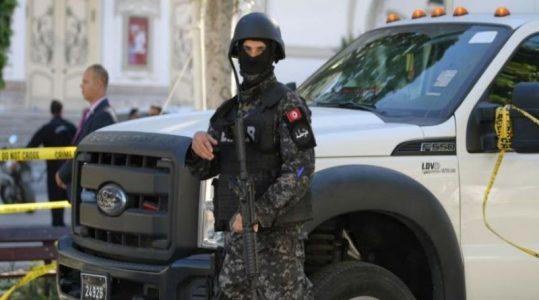
Female Tunis bomber had sworn allegiance to ISIS terrorist group
An unemployed graduate who blew herself up in Tunisia’s capital last month had sworn allegiance to the Islamic State group, the interior minister said on Monday.
Mna Guebla detonated a bomb near police cars on the busy upmarket Avenue Habib Bourguiba in central Tunis on 29 October, killing herself and wounding 26 people, mostly police officers, Hichem Fourati told parliament.
Guebla had used “secret communication channels” to make contact with “terrorist leaders inside and outside the country” and to swear allegiance to IS, he added.
Fourati said the 30-year-old had received online instructions on bomb-making from “terrorist elements” based in the country’s mountainous east, the epicentre of a long-running jihadist campaign of attacks targeting Tunisian security forces.
The attack was the first to rock the Tunisian capital since 2015.
Police sources said the assailant appeared to have used a homemade bomb rather than an explosive belt.
Guebla, who lived in a marginalised rural area in the eastern Mahdia region, was studying for a doctorate and spent hours on the computer locked in her room, but her family said there was no indication she was being radicalised.
After her death, authorities found “a quantity of raw materials used in the manufacture of explosives” at her house, Fourati said.
Local media have reported that her distraught family refused to receive the body and did not attend her burial.
Police had questioned her two younger brothers in the aftermath of the attack, according to their parents, who said their daughter was “naive” and had been “manipulated”.
They described her as a “model” young woman, who spent a lot of time at the computer.
Her family said that in the three years since she graduated, she had been unable to find a job and had instead occasionally worked as a shepherdess.
Nearly eight years since a revolution that toppled long-time dictator Zine El Abidine Ben Ali, Tunisia’s economy is stagnant and around a third of young graduates are unemployed.
Since 2011, jihadists have been waging a campaign of attacks targeting Tunisian security forces, particularly in the mountainous region near the Algerian border.
But Monday’s attack was the first in Tunis since November 2015, when a suicide bombing killed 12 security agents on a bus for presidential guards, a few hundred metres from the site of the latest attack.
The 2015 attack was claimed by the Islamic State group.
In June 2015, a student went on a shooting rampage in the coastal resort of Sousse and killed 38 people, including 30 Britons.
An attack in March that year on the Bardo National Museum in Tunis left 22 people dead, all but one of them foreign tourists.
Those attacks, also claimed by IS, devastated Tunisia’s crucial tourism sector, which made up seven percent of gross domestic product.
The country has been under a state of emergency since the November 2015 bus attack.
IS fighters swept into Iraq in the summer of 2014, taking control of nearly a third of the country. At the height of the group’s power its self-proclaimed caliphate stretched from the edges of Aleppo in Syria to just north of the Iraqi capital, Baghdad.
With its physical caliphate largely destroyed, IS is transforming from a “proto-state” to a covert “terrorist” network, “a process that is most advanced in Iraq” because it still controls pockets in Syria, according to a UN report.
The UN report said IS may still have up to 30,000 members roughly equally distributed between Syria and Iraq.
Source: Alaraby





